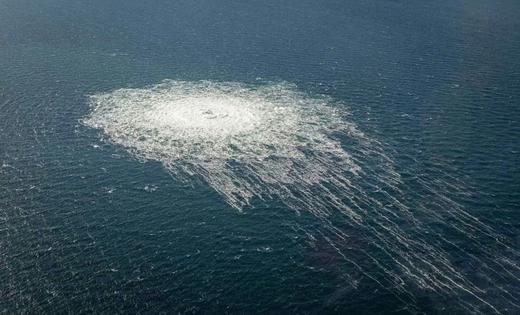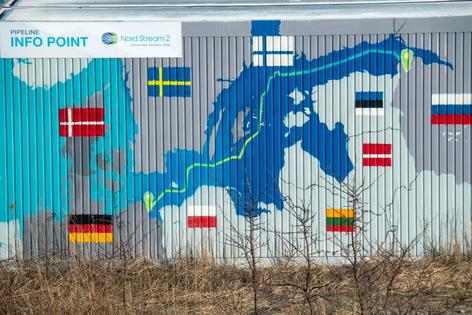Treating Nord Stream blasts as a whodunit misses the point – and plays into Russia’s plan to distract and divide
Published in Political News
In the two years since saboteurs planted explosives on Nord Stream 1 and 2 – gas pipelines that spanned the Baltic Sea to connect Russia to Germany – the finger of suspicion has fallen on a succession of possible culprits.
Immediately after the Sept. 26, 2022, blast, many Western experts blamed Russia. The theory was that Moscow blew up the pipelines as part of its “hybrid warfare” approach – showing a willingness and capability to attack critical infrastructure – or as a “false flag” operation to smear Ukraine.
Since then, journalists and pundits have suggested a range of culprits, including President Joe Biden and the CIA, Ukraine and Poland.
Swedish and Danish intelligence investigations ended in February 2024 without identifying the saboteurs, doing little to tamp down conspiracy theories.
Then, in August 2024, it was reported in German media that as part of the ongoing German investigation, prosecutors had issued an arrest warrant for a Ukrainian diving instructor living in Poland.
Kyiv has dismissed the claim of official complicity as “absolute nonsense”; meanwhile, Krzysztof Gawkowski, Poland’s deputy prime minister and the minister of digital affairs, suggested that the German findings were “inspired by Moscow” and intended to cause a rift between NATO countries.
Nonetheless, it has helped shift the consensus framing of the incident toward the blast being an international crime against majority Russian-owned civilian infrastructure.
And this represents a clear win for Russia. Cementing Russia’s narrative, rather than establishing the truth, may have always been the point for Moscow.
While investigators look for the motives, means and opportunity for the sabotage itself, observers of post-Soviet geopolitics and President Vladimir Putin’s tactics like myself can likewise examine Russia’s motives for framing the attack as a deliberate criminal act. And here, the Nord Stream case serves as a reminder of how effectively the Kremlin uses disinformation and manipulation to push its narratives, often to sow dissent in the West and distract from Russia’s actual crimes elsewhere.
This is true even when, as appears the case at the present with the Nord Stream blasts, the forensic evidence so far assembled aligns with Russia’s preferred narrative.
The Nord Stream explosions occurred seven months after Russia’s full-scale invasion of Ukraine. By then, the Kremlin’s military offensive had stalled and Putin was reorienting his efforts toward a long war of attrition. His military had already inflicted almost 15,000 civilian casualties, and September 2022 saw the start of sustained attacks on critical Ukrainian infrastructure, including dams, railways, hospitals, schools and the energy grid.
Built and operated by a consortium led by the majority state-owned Gazprom, the Nord Stream pipelines expanded Russia’s ability to weaponize energy by exerting control over natural gas pricing and rates of flow. For this reason, Putin’s adversaries, including Ukrainian President Volodymyr Zelenskyy, viewed Nord Stream 2 as a dangerous geopolitical weapon during its construction in 2021. Nord Stream 2’s completion meant Russia’s gas delivery to Europe – much of which is dependent on Russia for its natural gas needs – could largely bypass Ukraine and end the need to pay transit fees to both Ukraine and Poland.
As such, Ukraine had a clear interest in stopping the flow of gas through the Nord Stream pipelines. So, too, did Russia’s competitors in the European energy market, including Norway and the United States. And so too, arguably, did German political parties advocating for energy transition toward sustainable and renewable sources.
Despite being completed, Nord Stream 2 was not in use when Russia launched its full-scale invasion, having been blocked by German energy regulators. And Nord Stream 1, which had entered service in 2012, was shut down indefinitely by Russia in August 2022.
As such, it wasn’t such a jump for Western analysts to accuse Russia of destroying its own now-useless pipeline to signal its willingness and capacity to attack undersea infrastructure.
But as time passed, this view was crowded out by stories that treated the sabotage as a real-life whodunit mystery, with a focus on uncovering motives and means. Investigative journalists and other analysts studied statements in the public record, leaks from alleged whistleblowers, geospatial data, financial records and even reenactments of the attack in an attempt to crack the case.
Some, including Pulitzer Prize-winning journalist Seymour Hersh, traced responsibility all the way to the CIA and the Oval Office.
Unable to corroborate Hersh’s story, most U.S. media opted against echoing its claims, and the White House has consistently denied them.
Hersh’s take includes a belief that powerful Western interests pressured investigators and fed stories to the media to conceal the truth.
This second-order speculation – claiming that the original crime has been compounded by a cover-up – has long been promoted by Russia, too. After Sweden and Denmark halted their investigations, Moscow’s representative to the United Nations Security Council, Vasily Nebenzya, called for the U.N. to take over the investigation, saying: “It is as if a crime was committed — a murder — and a year later, the investigative authorities concluded that the victim was murdered.”
Russia has since accused German prosecutors of preparing to close the investigation without identifying those responsible.
The appeal of this framing to Moscow is clear. First, it fits Putin’s argument that NATO is constantly scheming against Russia. And second, it offers the promise of Russia recouping the cost of the Nord Stream sabotage from insurance companies. Insurers have so far refused to pay out, citing official findings that the sabotage was “an act of war.”
Moscow, in its relentless pursuit of proof of NATO and U.S. complicity, will likely not be satisfied by the German investigation’s single arrest warrant. Russia wants to put the U.S. in the dock, too – after all, President Joe Biden did threaten NATO action to shut down Nord Stream early in 2022. And Moscow responded to the German warrant of a Ukrainian by doubling down on its accusation that the U.S. ordered the attack.
Here, Russia could lean on the words of high-profile U.S. figures such as Republican Congresswoman Marjorie Taylor Greene, who has repeated disinformation from confirmed Russian propaganda outlets, and former Fox News host Tucker Carlson, who praised the quality of life in Moscow during a much-criticized Putin interview.
After the Nord Stream blasts, both Greene and Carlson were quick to assert that Russia was not responsible and, by implication, that the U.S. may have had a role.
Keeping the Nord Stream “mystery” alive distracts attention from Russia’s documented crimes in Ukraine, including attacking civilian infrastructure and, according to the U.N. Human Rights Council, displaying a “disregard for basic principles of humanitarian law and its human rights obligations.”
In the years since the Nord Stream blast, Russia has leaned on its extensive capacities in disinformation and propaganda to push its narrative. In this, Russia has form.
In January 2022, U.S. government sources reported that Russia was staging attacks against pro-Russian civilians in eastern Ukraine and blaming Kyiv, to justify the invasion. Similarly, analysts have cited the supposed May 2023 Ukrainian drone attack on Moscow as an example of Soviet-style “false flag” operations. It is this track record that has prompted German security personnel to suspect that in regard to Nord Stream, the evidence trail leading to Ukraine was fabricated by Russian operatives.
Speculation is seductive, and the Nord Stream case has attracted its fair share over the past two years – a period in which Russia has pursued a broad campaign to sow deliberate lies and disinformation. In that same period, Putin has persistently violated international law.
Russia’s narrative on Nord Stream may well, when all the investigations are said and done, be the dominant one. But what is clear is that Putin’s accusations against Ukraine and the United States are motivated not by commitment to justice, but by a drive to disrupt and distract. Truth is not his goal, but a target.
This article is republished from The Conversation, a nonprofit, independent news organization bringing you facts and trustworthy analysis to help you make sense of our complex world. It was written by: Keith Brown, Arizona State University
Read more:
How Vladimir Putin uses natural gas to exert Russian influence and punish his enemies
How Russia hooked Europe on its oil and gas – and overcame US efforts to prevent energy dependence on Moscow
Crippling civilian infrastructure has long been part of Russian generals’ playbook – Putin is merely expanding that approach
Keith Brown is the Director of Arizona State University's Melikian Center for Russian, Eurasian and East European Studies, that receives support from the US Department of State to train US graduate students in less-commonly taught languages of Russia, East Europe and Central Asia.
































































Comments